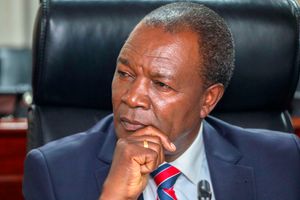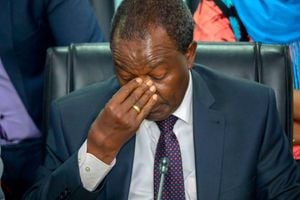
The main impact of the grey-listing by the Financial Task Force is that Kenya’s risk profile in terms of money laundering and terrorist financing has been raised.
Why has Kenya been put on the international money laundering grey list? How is that going to affect transactions with our trading partners? Are the links between local banks and financial institutions with whom they maintain correspondent banking relationships in the West and the rest of the world at risk?
The way I see it, the main impact of the grey-listing by the Financial Task Force (FATF)—the global body that monitors and enforces compliance on money laundering standards—is that the country’s risk profile in terms of money laundering and terrorist financing has been raised. Transactions between our banks and their correspondence banks in the rest of the world will now come under stricter scrutiny.
And with dealings between our banks and counterparties abroad being subjected to enhanced due diligence, cross-jurisdictional transactions are bound to suffer major delays, especially when it comes to trade with countries with stricter rules and controls against dealings with the grey-listed ones.
So, who should bear the blame for exposing us and for the omissions that have caused us to be put on this global list of shame and ignominy?
We can’t blame the law and the legal framework. We have fairly robust laws and institutions in this space. There was a time when the biggest beef between us and the FATF was the width of coverage of institutions with legal obligations to file suspicious transaction reports to the Financial Reporting Centre (FRC).
We on-boarded high-risk sectors such as property developers and agents on the list of reporting institutions. There were issues around Trust laws. So, we have introduced an amendment in Parliament with the intention of transferring the function of licensing and regulation of trusts from the Ministry of Lands to the Business Registration Service.
We had bigger problems with on-boarding law firms to the list because the legal fraternity protested by invoking the principle of client confidentiality. We jumped over that hurdle by introducing amendments to anti-money laundering law that were assented to by the President last year, on August 23.
The upshot of this amendment was that, from March 15 this year, all law firms will be under obligation to report suspicious transactions to both the Law Society of Kenya and the FRC.
Evaluation
So, why are we still being put on the watch list by the international money laundering police? Here is a bit of background. Before you are put on the list of shame by the FATF, you are evaluated against quantitative performance benchmarks and action plans which you will have agreed on and signed before the evaluation is done.
The way I see it, Kenya has been put on the list of shame mainly due to its poor record at prosecution and convictions. The global anti-money laundering police believes the level of investigations, prosecutions and convictions are not consistent with Kenya’s money laundering risk profile.
My own view is that, if blame is to be apportioned, the DCI, the EACC and the Office of the Director of Public Prosecutions must get their full share of it.
I have had the privilege of seeing and reading through some of the financial intelligence reports compiled by the FRC. I think that inadequate use of financial intelligence reports compiled FRC by law enforcement agencies is also a big factor in the whole equation. Our record on tracing and recovery of proceeds of crime and corruption remains unsatisfactory.
Yet another area of weakness is the lack of capacity to understand and investigate money laundering issues on the part of institutions and regulatory bodies in charge of some of the high-risk areas, such as banking, mining and the non-governmental organisations sector. The last time I checked, the complement of staff in charge of money laundering at the Central Bank of Kenya were less than a dozen.
The NGOs Co-ordination Board has no capacity to effectively monitor money laundering and terrorism financing in this sector. Furthermore, we don’t have adequate capacity and laws to monitor and trace money laundering activities in the area of crypto currency and digital lending.
Worse, the agencies in the anti-money laundering space work in silos. There is no working formal framework or mechanism for regular sharing of information.
My parting shot is a conspiracy theory. Any sober analyst will agree that Kenya has the strongest anti-money laundering framework in the region. Yet Uganda was recently dropped from the grey list.
Currently, power and influence within the FATF is in the hands of the EU member countries. I can’t help but feel that some of the pressure we are facing arise from the inordinately high money laundering risk profile that these powerful countries ascribe to the preponderance of Chinese and Somali property development in our big cities.







